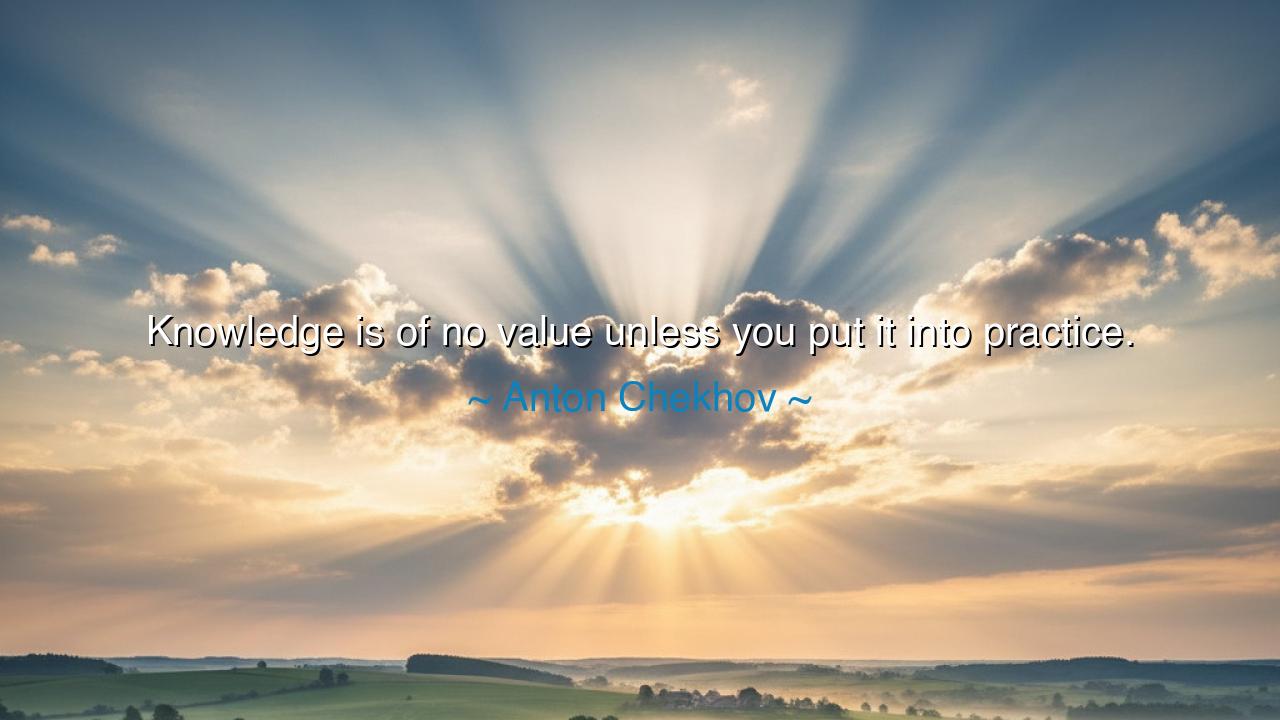
Knowledge is of no value unless you put it into practice.






Hear now the words of Anton Chekhov, the Russian sage of letters and the healer of bodies: “Knowledge is of no value unless you put it into practice.” In this saying he strikes at the heart of all idle learning. For knowledge locked away is like a sword kept sheathed in rust, or a lamp hidden beneath a basket—it may exist, but it shines not, it protects not, it serves not. Chekhov, who walked both as physician and as writer, knew well that truth must not only be known—it must be lived, breathed, and made flesh through action.
The ancients proclaimed this same wisdom. Confucius taught that to know and not to act is the same as not to know at all. The Stoics declared that philosophy is worthless unless it is embodied in life, turning words into deeds. For what is the purpose of wisdom if it does not heal, if it does not guide, if it does not strengthen? To collect truths without applying them is to build a treasury and never spend it, while the world outside perishes in poverty.
Chekhov himself bore witness to this union of word and deed. Though he wrote plays and stories that unveiled the deepest truths of the human heart, he also lived as a doctor, tending the sick, bringing relief where he could. He did not allow his knowledge of medicine to rest in books; he carried it into the villages, into prisons, into the darkest places of Russia. And in his writings, too, he transformed what he observed into living lessons, not abstractions. His life was proof that knowledge gains value only when it becomes practice.
Consider the story of Ignaz Semmelweis, the physician who discovered that handwashing reduced death among mothers in childbirth. His knowledge was clear, proven by observation. Yet many of his peers ignored it, leaving his discovery idle. Countless lives were lost because men refused to put truth into practice. Only later, when his findings were finally applied, did the world see the immense value hidden within his wisdom. What good is knowledge if it slumbers, if it waits while suffering cries out?
This teaching is also a warning to the proud scholar. Many fill their minds with facts, reciting texts, boasting of what they know. Yet if their lives remain unchanged, if they serve no one, if they build nothing, their knowledge is but a shadow—an echo of truth with no substance. True wisdom is measured not by what one can speak, but by what one can do. It is in action, in labor, in courage, that the worth of knowledge is revealed.
The lesson is clear: seek not only to learn, but to live what you learn. If you gain insight into kindness, practice it. If you discover the principles of health, embody them. If you are taught the paths of justice, walk them. Do not wait for perfection of understanding before you act, for action itself is the forge in which knowledge becomes strength. The smallest truth applied is greater than the greatest truth neglected.
What then must you do? Each day, take one piece of knowledge and make it flesh. Let it guide your hand, your word, your choice. Let every book you read and every lesson you hear bear fruit in your deeds. In this way, your knowledge will no longer be idle treasure, but living fire that warms, guides, and illuminates.
Thus remember Chekhov’s words: “Knowledge is of no value unless you put it into practice.” Let this be your creed. For the worth of truth is not in possession, but in application. And the one who acts, though he know but little, is greater than the one who knows much and does nothing.






AAdministratorAdministrator
Welcome, honored guests. Please leave a comment, we will respond soon